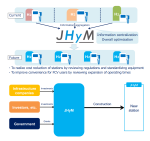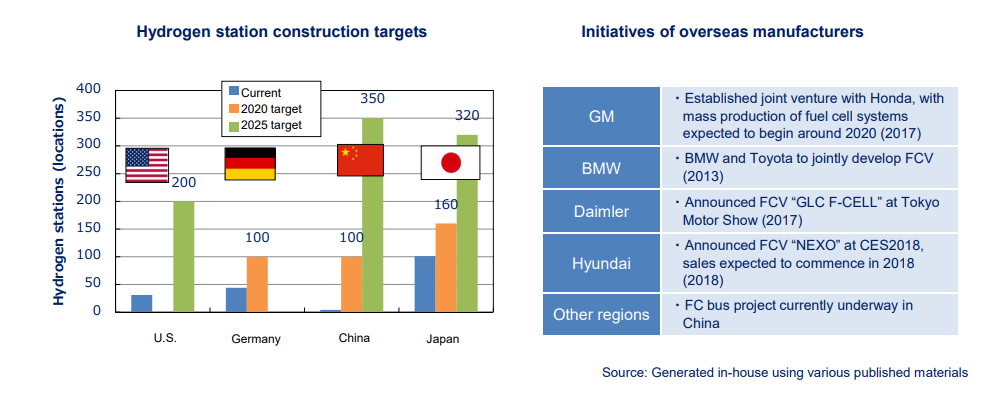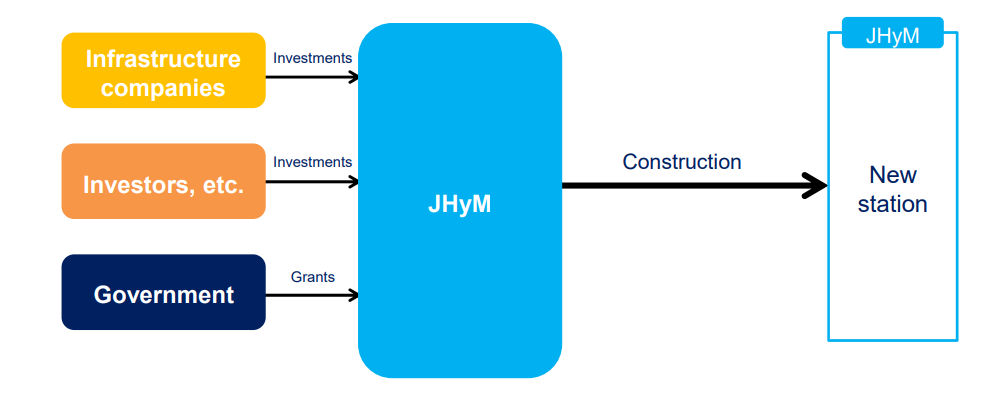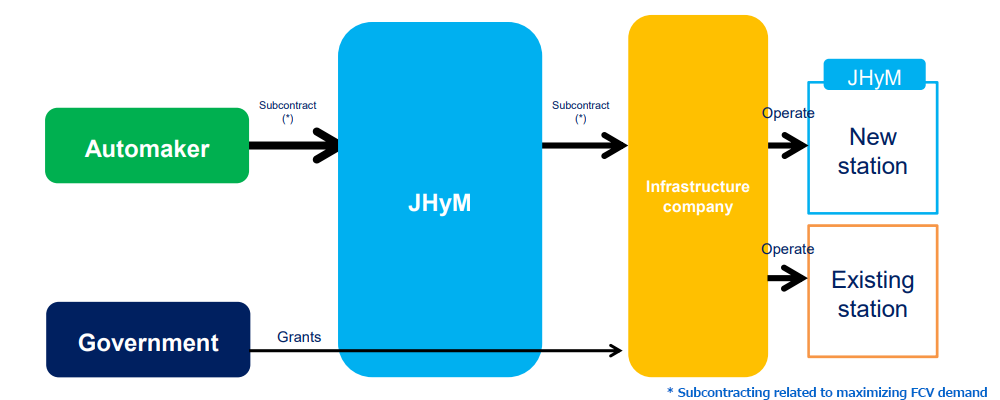10 large Japanese companies and one French company establish “Japan H2 Mobility” consortium to accelerating deployment the hydrogen station

Japan H2 Mobility, LLC established by eleven companies to accelerate deployment of hydrogen stations in Japan
Date: Mar 05, 2018
Source: Japan H2 Mobility, LLC.
- 10 large Japanese companies and one french company establish the “Japan H2 Mobility” consortium for the purpose of accelerating the deployment in Japan of hydrogen stations and fuel cell electric vehicles.
- The 11 founding companies will contribute, in connection with the stated ambition of the Japanese government,1 to the development of a large-scale hydrogen infrastructure in order to build a network of 320 stations by 2025, and 900 by 2030.
1Pursuant to the strategic roadmap presented by the Japanese Ministry of Economy, Trade and Industry (METI) on March 22, 2016.
The below-mentioned 11 companies have today announced joint establishment of “Japan H2 Mobility, LLC (hereinafter JHyM)”, aimed at the full-fledged development of hydrogen stations for fuel cell vehicles (FCV) in Japan.
The newly formed JHyM will foster the deployment of hydrogen stations throughout Japan under the guidance of the Japanese Central Government’s Ministerial Council on Renewable Energy, Hydrogen and Related Issues (“Basic Hydrogen Strategy” published on December 26, 2017). In alignment with Central Government policies, the 11 founding companies joined forces to create the world’s first framework in which not only infrastructure developers and automakers but also investors are involved in collaboration, based on the common belief in the effectiveness of hydrogen and FCV for mobility and continued sustainable societal development.
To tackle the key issues raised during the beginning stage of FCV promotion, JHyM will ensure that infrastructure developers, automakers, and investors each do their part to support the successful strategic deployment of hydrogen stations in Japan, promoting effective operation, and facilitating a positive cycle of improved convenience for FCV users. The ultimate goal of JHyM is to smoothly increase the number of FCV on the road in Japan, and thus to sustainability build the hydrogen station business.

Countries are focusing efforts on construction of hydrogen stations
and spread of FCVs
JHyM aims to complete its mission within 10 years. It intends to start building 80 stations nationwide by fiscal year 2021 in line with the Japanese Central Government’s “Strategic Road Map for Hydrogen and Fuel Cells” (revised March 22, 2016), and to further extend the network afterward. This roadmap released by the Council for a Strategy for Hydrogen and Fuel Cells targets the completion of about 160 hydrogen stations serving around 40,000 FCV by fiscal year 2020.

Reduce initial investments from infrastructure companies and use investments from investors

Through subcontracting, JHyM provides infrastructure companies with a stable, long-term environment for operating hydrogen stations
JHyM will take on the following specific initiatives:
1. Strategic deployment of hydrogen stations
- The new company will, while taking into account subsidies from the national government and initiatives of local governments, develop its own original “Hydrogen Station Deployment Plan,” in order to create an environment in which many users can enjoy driving fuel cell vehicles in Japan.
- Wider participation than its initial member companies is to be sought to ensure to complete the target deployment plan.
2. Contribution to efficient hydrogen station operation
By collecting and utilizing information regarding the construction and operation of hydrogen stations through infrastructure developers, which will oversee operations of hydrogen stations, the new company, which will deploy and own stations nationwide, will contribute to efficient operations and other road map objectives in the following ways:
- Improvement of convenience for FCV users
In order to encourage customers to use hydrogen, JHyM will improve the convenience of stations, coordinating with the Association of Hydrogen Supply and Utilization Technology (HySUT), an industrial association of hydrogen station developers, for example by extending the number of service days per week to meet increased demand. - Cost reduction and regulation review
JHyM will collaborate with external organizations, such as the Fuel Cell Commercialization Conference of Japan (FCCJ) and HySUT, to reduce cost by addressing issues such as the standardization of equipment and revision of regulations.
The following key roles and responsibilities are undertaken by the founding member companies of JHyM:
- Infrastructure developers will contribute some capital, construct hydrogen stations, and operate them.
- Automakers will entrust infrastructure developers to operate the hydrogen stations through JHyM, to help promote the expansion of hydrogen stations and FCV.
- Investors will contribute to scaling-up the deployment of hydrogen stations in the future with financial means. They will partially cover station deployment costs through investments in JHyM. By providing the funds necessary until the hydrogen station business becomes commercially sustainable, they will help reduce the initial financial burden borne by infrastructure developers and will help attract new participants.
JHyM will start operating in April 2018, aiming to attract the wider participation of hydrogen station operators and investors, and to achieve sustainable hydrogen station business and FCV development in Japan.









